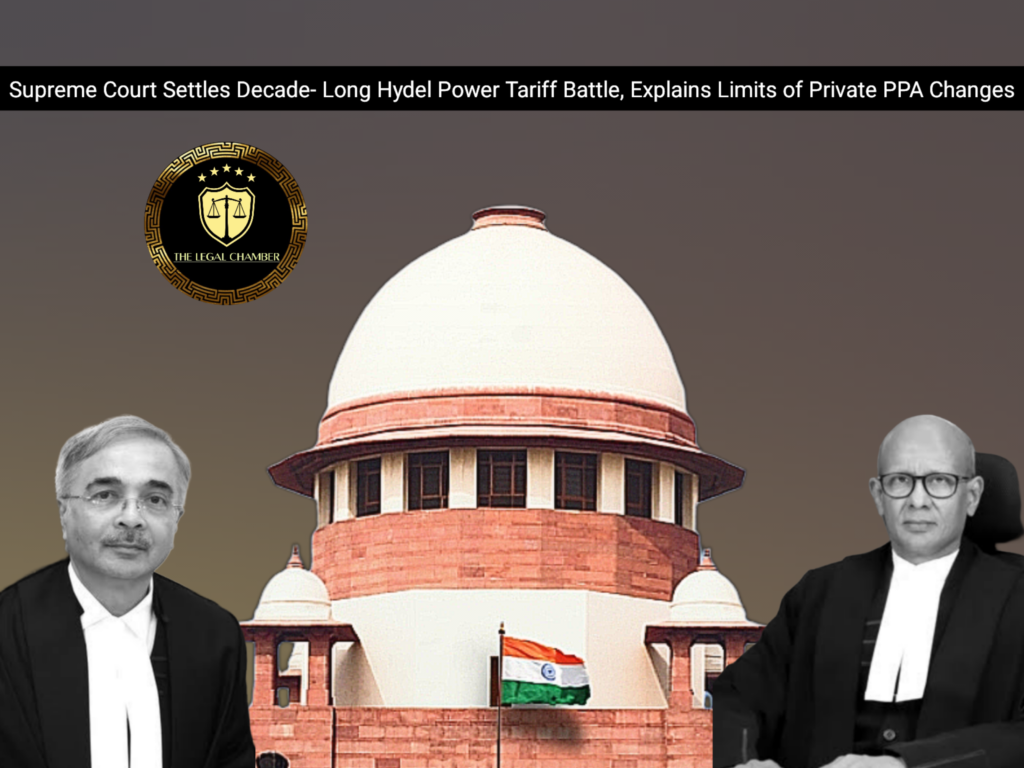
The Supreme Court affirmed that the electricity tariff and Power Purchase Agreements (PPAs) are not purely private contracts. Under Section 86(1)(b) of the Electricity Act, 2003, they must be reviewed and approved by the State Electricity Regulatory Commission. A generating company and distribution licensee cannot unilaterally set or modify tariffs without the regulatory commission’s mandatory approval.
Facts Of The Case:
The case originated from a dispute over the tariff payable for electricity supplied by M/s. KKK Hydro Power Limited. The company initially established a 3 MW hydro plant under a 2000 Power Purchase Agreement (PPA) with a fixed tariff of ₹2.50/kWh. In 2007, it augmented the project’s capacity to 4.90 MW. A new PPA was executed in 2008 for the revised capacity, but it retained the old tariff while also stating it was subject to forthcoming state regulations. When the Himachal Pradesh Electricity Regulatory Commission later set a higher generic tariff of ₹2.95/kWh for small hydro projects, the power company and the electricity board bilaterally executed a supplementary PPA in 2010 to adopt this new rate. The Regulatory Commission later held this supplementary PPA was invalid as it lacked prior regulatory approval. On appeal, the Appellate Tribunal ruled that the old tariff applied to the original 3 MW unit, but the enhanced 1.90 MW capacity was eligible for the higher tariff, directing a weighted average rate for the entire project. The Supreme Court ultimately dismissed the power company’s appeal, upholding the legal principle that tariff-setting requires regulatory approval and cannot be done by private agreement alone.
Procedural History:
The dispute began when M/s. KKK Hydro Power Limited filed Petition No. 6 of 2011 before the Himachal Pradesh Electricity Regulatory Commission (HPERC) seeking arrears based on an enhanced tariff. The HPERC dismissed this petition, upholding the original tariff. Aggrieved, the appellant appealed to the Appellate Tribunal for Electricity (APTEL). The APTEL, vide its judgment dated 17.10.2014, partially allowed the appeal, directing that a weighted average tariff be determined for the project. This decision of the APTEL was then challenged by the power company before the Supreme Court of India through the present civil appeal, which culminated in the judgment dated August 29, 2025, dismissing the appeal and affirming the HPERC’s stance on the invalidity of the unapproved supplementary PPA.
READ ALSO:Supreme Court Ruling: Key Lesson for Armed Forces, Location Misrepresentation is a Punishable Offence
Court Observation:
The Supreme Court observed that the Appellate Tribunal (APTEL) erred in granting relief by ignoring the binding mandate of Section 86(1)(b) of the Electricity Act, 2003. The Court authoritatively clarified that a Power Purchase Agreement (PPA) and the tariff stipulated therein are not matters of private negotiation. It emphatically ruled that a generating company and a distribution licensee cannot, by private agreement, execute a PPA or stipulate a tariff without the mandatory review and approval of the State Electricity Regulatory Commission. The Court held that the supplementary PPA of 2010, which unilaterally enhanced the tariff, was legally unenforceable as it lacked this crucial regulatory approval. However, the Court chose not to interfere with the final outcome of the APTEL’s order since the State Electricity Board had accepted it and a new tariff had been in operation for a long time, thereby settling the position.